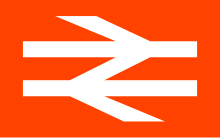 Great British Railways Transition Team logo | |
| Company type | State-owned enterprise |
|---|---|
| Industry | Railway transport, infrastructure and asset management |
| Predecessor |
|
| Headquarters | , England, UK |
Area served |
|
| Products | Public transport |
| Owner | |
| Website | gbrtt |
Great British Railways (GBR) is a planned state-owned company that is to oversee rail transport in Great Britain except for Transport for London, Merseytravel, light rail and tram services.
The publicly-owned body is set to replace the previous system of passenger rail franchising which lasted from 1996 until its effective abolition in 2021. GBR will absorb train operating companies as their contracts expire, bringing passenger services back under one entity for the first time since the privatisation of British Rail. However this will not extend to services provided by open-access operators.
The body will also take over the responsibilities of Network Rail, becoming the owner and manager of railway infrastructure across Great Britain, reintegrating track and train under one company. GBR's headquarters will be based in Derby.
These changes will not affect the existing powers of the UK's devolved governments in their areas.
History
Great Britain's railway system was built by private companies, but it was nationalised by the Transport Act 1947 and was run from then onwards by British Railways (which traded as British Rail from 1965) until privatisation, which was begun in 1994 and completed in 1997. Infrastructure, passenger, and freight services were separated at that time. The infrastructure was privately owned and operated by Railtrack from 1994 to 2002, when it was renationalised and transferred to Network Rail.[1] Goods (freight) services are operated by a number of companies, the descendants of those created during the 1990s privatisation.
During 2020, in the midst of the COVID-19 pandemic, all passenger train operating companies (TOCs) entered into Emergency Recovery Measures Agreements with the UK and Scottish Governments.[2] Normal passenger service franchise mechanisms were amended, transferring almost all revenue and cost risk to the government, effectively re-nationalising those services temporarily.[3][4]
The new GBR organisation was proposed under the Williams–Shapps Rail Review,[5] which was published as a white paper on 20 May 2021.[6] The review had been launched in September 2018 and was led by Keith Williams.[6][7]
A fortnight before the Williams–Shapps Plan for Rail was unveiled, the Department for Transport (DfT) gave notice of a £6.5 million contract for Deloitte up to February 2023 as its "strategic change delivery partner: rail reform programme".[8]
Andrew Haines and Peter Hendy, who were the CEO and chairman of Network Rail respectively, were appointed to oversee the establishment of GBR.[9][10]
In October 2022, Transport Secretary Anne-Marie Trevelyan announced that the Transport Bill, which would have set up GBR, would not go ahead in the current parliamentary session.[11][12] In February 2023, Transport Secretary Mark Harper re-affirmed the government's commitment to GBR and rail reform.[13] The 2023 King's speech announced the progression of a draft Rail Reform Bill which would enable the establishment of GBR, although it has not been timetabled in the Parliamentary programme.[14] The Transport Secretary Mark Harper later told the Transport Select Committee that the legislation was unlikely to reach Royal Assent within the 2023–2024 parliamentary session.[15]
Labour government (July 2024–present)
Prior to the 2024 general election, the Labour Party confirmed that it would be seeking to bring railways into public ownership,[16] while preserving the role of open-access operators.[17]
In the 2024 King's Speech, the new Labour government announced that GBR would be established by two bills in the current parliamentary session: The "Passenger Railway Services (Public Ownership) Bill", which will bring rail franchises into public ownership as their contracts expire, and the "Railways Bill", which will establish GBR to oversee the passenger and freight rail network.[18][19][20][21]
On 3 September 2024, the government announced that the organisation would be created at first in "shadow" form, pending legislation to formally create it. The chief executives of DfT OLR Holdings and Network Rail and the Director General for Rail Services in the Department for Transport have been tasked with running Shadow Great British Railways in order to "[work] in closer collaboration, bringing together track and train to deliver for passengers and freight users." [22]
Headquarters

The government promised to base the organisation outside London to promote economic growth and skills in a region beyond the capital.[23] In February 2022, the DfT launched a public consultation for the location of GBR's headquarters.[24] In total, 42 towns and cities submitted expressions of interest.[25]
A shortlist comprising Birmingham, Crewe, Derby, Doncaster, Newcastle upon Tyne, and York was announced in July 2022,[26] using the following criteria: alignment with "levelling up" objectives; connected and easy to get to; opportunities for GBR; railway heritage and links to the network; value for money; and public support.[26] A public vote was held following the announcement.[26]
In March 2023, then Transport Secretary Mark Harper announced Derby as the headquarters location.[27][28]
Scope and powers
Great British Railways is planned to operate in the existing areas of Network Rail, i.e. England, Scotland and Wales. Northern Ireland – where the railway is already operated by the vertically integrated and wholly state-owned Northern Ireland Railways – was explicitly excluded from the scope of the Plan for Rail and rail is not a reserved matter in Northern Ireland.[5]: 25
GBR's powers are unconfirmed as of April 2023.[13] However, the Williams-Shapps Plan for Rail suggested that GBR will develop rail strategies, manage budgets and operations, own stations and infrastructures and manage the procurement of contracts.[5]: 30 Transport Secretary Mark Harper has said that the government will respond to consultation on those powers in summer 2023.[13]
Under devolution, a number of powers relating to rail services are devolved to devolved administrations in Scotland, Wales, London and Merseyside. According to the Plan for Rail, these current powers will be unaffected. The Plan states that GBR will co-operate with devolved administrations, but that those administrations will need to work with GBR to improve consistency across the national network.
Under Network Rail, all stations are formally in public hands since 2014, but only 20 (mainly large termini and central stations) are managed directly by it. GBR will own all stations and most infrastructure in Great Britain. Existing leases of stations to devolved transport authorities will continue. Dedicated station management teams will be created within regional divisions of GBR to manage stations and land. GBR will develop masterplans for station renewal.[5]
Regions
GBR will be made up of five regional divisions, organised in line with Network Rail's 'Putting Passengers First' programme. Budgets and delivery will be held at the local level as well as at the national level. Regional divisions will manage concession contracts, stations, infrastructure, and local and regional budgets, integrate track and train, and integrate rail with local transport services.[5]
Branding

GBR will use modified forms of British Rail's Double Arrow symbol and Rail Alphabet typeface – Rail Symbol 2 and Rail Alphabet 2 respectively – for its branding. The Williams-Shapps plan recommended that there will be a single, unifying brand for railways, and it is expected that this will be a gradual rebranding over time. English regions, Scotland, and Wales will have their own variants, but these will still emphasise the national nature of GBR. The white paper does not specify whether the branding of devolved railways such as London Overground and Merseyrail will be affected.[5]
See also
- History of rail transport in Great Britain 1995 to date
- Impact of the privatisation of British Rail
- Campaign to Bring Back British Rail
Notes
References
- ^ "Network Rail closer to Railtrack takeover". BBC News. 18 September 2002.
- ^ "The ONS classifies train operating companies now running under emergency measures agreements". Office for National Statistics. 31 July 2020. Retrieved 12 April 2021.
- ^ Moran, Mark (3 August 2020). "UK rail effectively 'renationalised' during pandemic". TransportXtra. Retrieved 12 April 2021.
- ^ British government announces plans for major railway sector reform International Railway Journal 20 May 2021
- ^ a b c d e f "Great British Railways: Williams–Shapps plan for rail". GOV.UK. Department for Transport. 20 May 2021. Retrieved 20 May 2021.
- ^ a b "Rail services to come under unified state control". BBC News. 19 May 2021. Retrieved 19 May 2021.
- ^ "Grayling launches "no stone unturned" review into Britain's railway". www.railmagazine.com. Retrieved 6 January 2023.
- ^ Delivery Partner Contracts BidStats
- ^ Pickard, Jim; Georgiardis, Philip (17 May 2021). "UK railways braced for biggest shake-up in decades". Financial Times. Retrieved 19 May 2021.
- ^ Topham, Gwyn (16 May 2021). "UK railways brace for shake-up and cuts as long-overdue review arrives". The Guardian. Retrieved 19 May 2021.
- ^ "Great British Railways transport bill shelved". BBC News. 19 October 2022. Retrieved 27 October 2022.
- ^ "Great British Railways plan 'delayed' as Liz Truss pulls transport bill". The Independent. 19 October 2022.
- ^ a b c Harper, Mark (7 February 2023). "George Bradshaw address 2023: The Transport Secretary affirms his commitment to the rail sector and outlines plans to modernise the industry". Department for Transport. Retrieved 8 April 2023.
- ^ "King's Speech: Derby-based 'Great British Railways' promised in draft bill". ITV News. 7 November 2023.
- ^ "Minister admits rail reform legislation 'unlikely' before general election". The Independent. 16 November 2023. Retrieved 21 November 2023.
- ^ "Labour to begin rail nationalisations within months". Financial Times. 18 July 2024. Retrieved 28 August 2024.
- ^ "Getting Britain Moving: Labour's Plan to Fix Britain's Railways" (PDF). Labour. 25 April 2024. Retrieved 2 September 2024.
- ^ "Rail reform and establishment of Great British Railways confirmed for this Parliament". New Civil Engineer. 17 July 2024. Retrieved 20 July 2024.
- ^ "Labour's plan for our railways: How we will deliver for passengers with Great British Railways". The Labour Party. 25 April 2024. Retrieved 18 July 2024.
- ^ Elgot, Jessica; Topham, Gwyn (24 April 2024). "Labour promises rail nationalisation within five years of coming to power". The Guardian. Guardian News & Media Limited. Retrieved 3 May 2024.
- ^ "Labour will 'reveal plan to nationalise railways in King's Speech'". The i. 6 July 2024.
- ^ "Establishing a Shadow Great British Railways". gov.uk. HM Government. 3 September 2024. Retrieved 4 September 2024.
- ^ Hakimian, Rob (5 October 2021). "Search on for Great British Railways headquarters". New Civil Engineer. Retrieved 2 September 2024.
- ^ "Public competition launched to find new home for Britain's Railways". gov.uk. Department for Transport. 5 February 2022. Retrieved 2 September 2024.
- ^ "List of the 42 bidders to host Great British Railways headquarters". Railway Gazette. 18 March 2022. Retrieved 2 September 2024.
- ^ a b c "Public vote and official shortlist announced to choose home of Great British Railways". gov.uk. Department for Transport. Retrieved 2 September 2024.
- ^ Torr, George; Watson, Greig; Roberts, Georgia (21 March 2023). "Great British Railways: Derby chosen as location for new rail HQ". BBC News. Retrieved 2 September 2024.
- ^ "Derby named as home of Great British Railways HQ" (Press release). Department for Transport. 21 March 2023. Retrieved 31 July 2024.
External links
- Official website
 for the Great British Railways Transition Team
for the Great British Railways Transition Team




